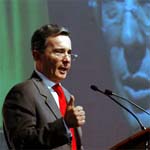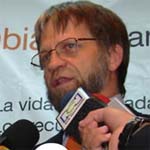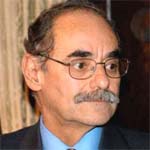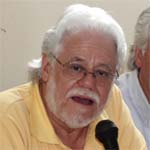|

|
Candidate:
Álvaro
Uribe Vélez
Alvaro Uribe was born in Medellín, Colombia on
July 4, 1952. He graduated from the University of Antioquia
in 1977. At the age of twenty-five, in 1977-78, he served
as general secretary of Colombia's Labor Ministry. He headed
the Colombian government's Civil Aviation agency (equivalent
of the U.S. Federal Aviation Administration) between 1980
and 1982. He was mayor of Medellín in 1982-83, and
a Medellín city councilman from 1984 to 1986. Uribe
was a senator from 1988 to 1993, and governor of Antioquia
department (of which Medellín is the capital) from
1995 to 1997.
As
a third-party presidential "pre-candidate" during
Andrés Pastrana's presidency (1998-2002), Uribe was
one of the harshest critics of Pastrana's attempts to negotiate
with guerrilla groups. The candidate instead proposed an "iron
fist" approach. In early 2002, as the negotiations failed,
Uribe's popularity skyrocketed. He won a first-round majority
in the May 26, 2002 presidential elections.
Uribe
has enjoyed consistently high ratings in Colombian polls,
as his tough security policies and his disarmament negotiations
with paramilitary groups have sharply reduced armed-group
activity and common crime in urban areas and along principal
roadways. In 2005, Colombia's Congress amended the nation's
constitution to allow Uribe to run for re-election. In March
2006, pro-Uribe parties together won wide majorities in both
houses of the Congress.
Uribe's
running mate is the current vice-president, Francisco Santos,
a former newspaper publisher and anti-kidnapping activist.
PROPOSALS
Security
If
reelected, Uribe promises to continue his tough "Democratic
Security" strategy, which involves expanding the security
forces, launching offensives to re-take guerrilla-held territory,
encouraging desertions and demobilizations, detaining hundreds
of civilians suspected of supporting guerrillas, and involving
citizens as informants.
Relations
with the United States
To
a greater extent than most of Latin America's current elected
leaders, Uribe will continue to seek close relations with
the U.S. government. This includes enthusiastic support for
Plan Colombia, especially aerial herbicide fumigation in coca-growing
areas, and advocacy of the free-trade agreement that the United
States and Colombia signed in early 2006 (neither side has
yet ratified the pact).
Economy
Uribe
sees little state role in social and economic development,
and actively promotes privatizations, low income taxes, and
encouragement of foreign trade and investment as his preferred
response to poverty. His critics charge that his government
has allowed government social expenditure to stagnate.
Peace
Uribe's
policy regarding peace negotiations has been to dialogue with
any group that first agrees to a cease-fire. Right-wing paramilitary
groups accepted that offer in December 2002, and have largely
completed a resulting demobilization process, with over 31,000
paramilitaries turning themselves in so far. In his likely
second term, Uribe must deal with the former paramilitary
leaders' continued political power and criminal networks;
victims' demands for justice and reparations; the challenges
of re-integrating thousands of former fighters; and uncertainty
following a May 2006 Constitutional Court decision toughening
what was a lenient law for dealing with paramiltiaries' past
crimes.
Colombia's
second-largest guerrilla group, the National Liberation Army
(ELN), is currently in talks with Uribe's government about
cease-fire terms. These talks will either move quickly forward,
or fall apart entirely, once the election outcome is known.
Uribe
has indicated that he would expand a one-month demilitarized
zone in southwestern Colombia, which would bring him closer
to meeting the FARC guerrillas' pre-condition for negotiating
the release of dozens of prominent hostages whom they have
been holding for years.
|
|

|
Candidate:
Antanas Mockus Sivickas
Antanas
Mockus was born March 25, 1952 in Bogotá, Colombia.
He has a BA from Bogotá's National University, a
Masters in mathematics from Frances' Dijon University, and
a Ph.D. in philosophy from the Paris XIII University. In
1995, after an atypical campaign, Mockus (whose surname
is of Lithuanian origin) was elected mayor of Bogotá.
He stepped down in 1997 to consider a run in the 1998 presidential
elections. He was re-elected in 2001 and served until 2003.
He was a popular mayor, getting credit for improving the
quality of life in Bogotá and managing the city's
finances transparently and honestly. In 2000 Mockus founded
the Visionary Party oriented towards "social mobility,
respect and love of life, and sacred use of public resources."
Mockus'
running mate is María Isabel Patiño, whose
background combines academia, business and Bogotá
city government.
PROPOSALS
Economy
"The
state must maintain and create favorable conditions so that
entrepreneurs and workers generate wealth."
Relations
with the United States
Mockus
has said that Colombia's foreign policy currently gives
the United States a "privileged position," and
while he does not propose to change that radically, he would
do more to promote integration among Latin American countries.
Mockus favors the Free Trade Agreement with the United States.
Paramilitary
demobilization and reintegration
"Among
the most serious problems that demobilized people face are
a lack of government guarantees in issues such as training
and labor options. It seems that the majority of demobilized
people don't have either a job or sufficient support to
start up a business, and a lot of them have difficulties
living in civilian society. The key is that the state must
show leadership of reinsertion programs, the leadership
can't be in the hands of those who once were leaders of
armed groups. Instead of a new "war tax," reinsertion
must be financed through cooperation among national, departmental,
and municipal entities with international assistance."
Security
Mockus
views cultural change as key to resolving problems like
security. "The fundamental objective on the security
policy is to protect life. There are 66 deaths for every
100,000 inhabitants in Colombia. Of those 64% correspond
to homicides and 18.4% traffic accidents. 27% of homicides
correspond to the armed conflict. For this reason the security
policy must not center on national security and threats
like terrorism and subversion, but also must focus on citizen
security. It also must focus on strengthening democracy,
crime prevention, and education in safe conduct, conflict
resolution, trust, solidarity and cooperation."
Ethnic
and Sexual Minorities
"It's not enough to respect free development of
personality and individual autonomy to make these minorities
rights effective. Let's promulgate a law that recognizes
the legitimacy of the different types of families that exist
in this country."
|
|

|
Candidate:
Horacio Serpa
Uribe
Horacio
Serpa was born January 4, 1943 in Bucaramanga, Santander.
He majored in Law and Political Science at Barranquilla's
Atlantic University. He served as a judge in various towns
of Santander from 1966 to 1970. From 1971 to 1974 he served
as director of the National Commerce Federation (FENALCO),
director of Family Welfare Services and guest professor
at Harvard and Cambridge Universities. From 1974 to 1991
he served as town councilman in Barrancabermeja, Bucaramanga
and other municipalities. He was a senator as well as vice
president of the senate. From 1991 to 1997 he was mayor
of Barrancabermeja, Secretary of Education, and Minister
of the Interior. He ran unsuccessfully for president against
Andrés Pastrana in 1998 (though he received the largest
vote in the first round) and against Álvaro Uribe
in 2002. In 2003, Uribe named Serpa his ambassador to the
OAS.
Serpa's
running mate is Iván Marulanda, a longtime Liberal
Party politician.
PROPOSALS
Peace
Serpa supports "intermediate dialogue with armed
groups over the bases and conditions for a political negotiation.
This dialogue won't be, for the illegal armed groups, a
tactical means of strengthening themselves." Serpa
favors a hostage-release / prisoner exchange agreement with
the FARC as soon as possible.
Economy
Serpa supports a stronger welfare state. "Our commitment
consists in realizing all legislative and administrative
actions necessary for Colombia to build, according to the
Constitution, a social security system that assures all
Colombians efficient provision of health service, pensions
and insurance for all workers against the loss of income
caused by unemployment." He also plans to focus on
equality in education and housing opportunities.
Foreign
Policy
"Our political platform concerning international policy
will insist on multilateralism, unrestricted respect for
international law, compliance with international treaties
and non-intervention in other countries' internal affairs.
We will support the working order of the International Criminal
Court and the tightening of the Inter-American system as
well as the Inter-American Democratic Charter."
Relations
with the United States
Relations between Serpa and the U.S. government have traditionally
been chilly. This is largely because Serpa, as interior
minister, was a fierce defender of President Ernesto Samper
(1994-98), who lost his U.S. visa due to allegations that
he took campaign funding from the Cali drug cartel. Serpa
opposes the Free Trade Agreement (TLC). He is a frequent
critic of Plan Colombia.
|
|

|
Candidate:
Carlos Gaviria
Díaz
Carlos
Gaviria was born May 8, 1937 in Bogotá, Colombia.
He graduated from the University of Antioquia
in 1961, and studied law at Harvard Law School from 1970
to 1971. His background is laregly academic, as a
scholar of law and human rights. From 1993 to 2001 he was
a justice on Colombia's Constitutional Court (part of the
country's Supreme Court). He was one of the top vote-getting
candidates for the Senate in 2002, where he served until
2006.
Gaviria
is the first presidential candidate in many years from a
single unified independent leftist party, combining many
previous progressive movements and splinter parties. He
suprised many by defeating well-known Senator Antonio Navarro,
a former leader of the M-19 guerrillas, in the Alternative
Democratic Pole's March 2006 primary. Surveys now indicate
that Gaviria is running a distant second to Uribe. His standing
in the polls has more than doubled since March to about
20 percent; most of these gains have been at the expense
of Liberal Party candidate Horacio Serpa.
Gaviria's
running mate is Patricia Lara, a prominent journalist and
author.
PROPOSALS
Peace
"We recognize the existence of social and armed conflict
within our country. We urge political parties, organizations
and social movements, businesspeople, peasant organizations,
indigenous people and other social groups to work together
to build a dialogue policy with the armed groups. We will
demand that all the armed sectors respect the civil population,
and we will strive for humanitarian agreements between the
state and the armed groups. We will also adopt a national
policy to overcome the humanitarian crisis that the country
is going through, focusing especially on the areas that
suffer displacement and confinement."
Security
According
to the Colombian newsweekly Cambio, "Instead
of Plan Patriota and Democratic Security, he will enact
a plan to bring state institutions to the entire country,
and to attack the causes of the conflict."
Drug
Policy
"We will debate decriminalization of the production
and consumption of narcotics, and we will lead an initiative
in Congress. We will create cultural strategies and public
health strategies to prevent drug consumption. We will attack
the supply of narcotics by providing different production
alternatives for peasants."
Economy
Gaviria proposes a large state role in the economy, including
increased protectionism. "We seek recovery of the social,
cultural and productive role of land by seeking a major
boost in food productivity, thereby guaranteeing nutritional
sovereignty and self-sufficiency; we will restrict imports
of agricultural products that can be produced in Colombia;
establish stable prices guaranteed by the state; control
costs of agricultural inputs and other production expenses;
create sufficient economic credits for campesinos;
and respect and enlarge lands belonging collectively to
campesinos, indigenous and black communities. We
will also give a boost to national industry and support
the creation of small and medium businesses; and we will
protect communities' work by strengthening national productivity
and internal marketing, and restricting imports of products
not made in Colombia. We propose to strengthen unemployment
insurance and subsidies."
Foreign
Policy
"We demand and will carry out the principle of national
self-determination. We will stimulate relations with different
countries in Latin America and the Caribbean, the European
Union, Africa and countries from the Pacific. We will support
the process of alternative integration of the Americas,
linking the South American community of nations. A main
focus is economic sovereignty with regard to multilateral
organisms like the Word Bank and International Monetary
Fund."
Relations
with the United States
Gaviria strongly opposes Plan Colombia and fumigation of
illicit crops. "We will remove U.S. military bases
from Colombia and demand that all foreign troops exit Colombian
territory." Gaviria opposes the Free Trade Agreement
with the United States.
|
|
Napoleón
Franco, May 13-16:
-
Álvaro
Uribe 57% (+1 since March)
-
Carlos
Gaviria 19%
(+10 since March)
-
Horacio
Serpa 13% (-12 since March)
-
Antanas
Mockus 1% (-1 since March)
Invamer
Gallup, May 12-15:
-
Álvaro
Uribe 61.2% (-2.9 since March)
-
Carlos
Gaviria 20.4% (+10.5 since March)
-
Horacio
Serpa 13.7% (-5.9 since March)
-
Antanas
Mockus 0.9% (-1.9 since April)
Zogby
/ Miami School of Communication, May 10-14:
-
Álvaro
Uribe 67.0%
-
Carlos
Gaviria 14.8%
-
Horacio
Serpa 11.1%
-
Antanas
Mockus 1.4%
|




